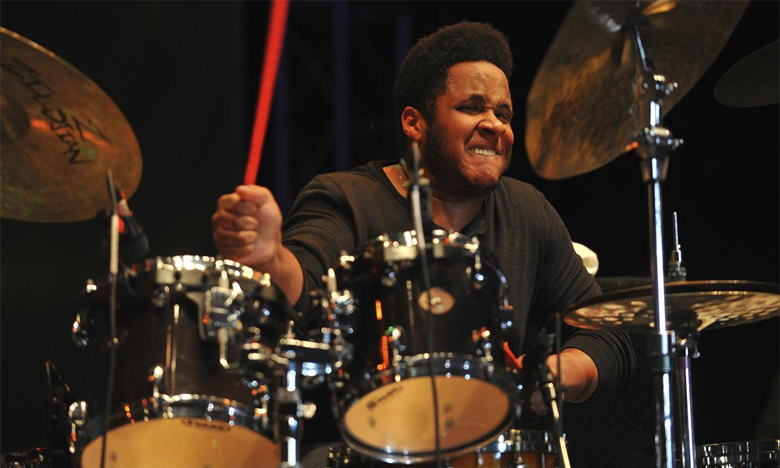Ronald Bruner Jr. grew up in a tough, Crips-plagued Los Angeles neighborhood between Compton and Watts. It was so dangerous, in fact, that he was not allowed to play in the front yard out of fear of catching a stray bullet.
And yet, the sound of shots is hardly what stuck from his childhood. Instead, 34-year-old Bruner, the son of talented musicians who doled out heavy-handed discipline to keep their kids on the straight and narrow, grew up to become one of the most sought-after jazz drummers in the country. In March, he dropped his bombastic solo debut, Triumph, an R&B/soul album that Vice declared made him “a generational talent in his own right on the kit.” Thank his parents, the sorts who expected their kids to act right in church … or else.
This Bruner, the older brother of Jameel “Kintaro” Bruner, keyboardist and former member of the Odd Future offshoot the Internet and omnipresent bassist Stephen “Thundercat” Bruner, could be overshadowed by his arguably more famous brothers. But his résumé is envy-inducing itself, studded as it is with contributions to Kendrick Lamar’s platinum 2015 landmark To Pimp a Butterfly and stage and studio time with an eclectic bag of acts ranging from veteran hardcore punk Suicidal Tendencies, bass hero Stanley Clarke, late jazz fusion keyboardist and mentor George Duke (who is featured on Triumph), electronic jazz rebel Flying Lotus, alternative soul priestess Erykah Badu, A Tribe Called Quest front man Q-Tip and late genre-hopping genius Prince. Beyond such holy-shit credits, the talkative optimist, who counts drumming immortal Billy Cobham among his influences, is a card-carrying member of the L.A.-based collective the West Coast Get Down. (“Everyone wants to work with them,” says Sean J. O’Connell, frequent contributor to the influential jazz bible DownBeat, of the group.)
"THEY ARE SHOWING THESE KIDS THAT JAZZ IS NOT THIS ARCHAIC ARTFORM. IT CAN BE COOL; IT CAN BE HIP."
“There’s not much I’m afraid of,” sniffs the Grammy-winning dynamic stickman. By 8, Bruner had already conquered performance jitters after playing with iconic jazz saxophonist Wayne Shorter. Yet there is one obstacle that nearly grounded Bruner. “I had a big issue that I was going to have to sing live,” he says. He dreaded the first time he stepped from behind the drum kit to perform at his March album release show at L.A.’s Regent Theater. “But when it was time to walk out onstage, I got off the drums and I said, ‘You know what? You get through this first song, you are good for the rest of your life.’ ”
Most of Triumph’s 11 tracks were recorded during a 30-day period that produced 170 songs, some of which can also be heard on Miles Mosley’s January-released Uprising and saxophonist Kamasi Washington’s The Epic. Vocalist Danielle Withers, who can be heard on Bruner’s bubbly up-tempo “Sensation,” describes the Triumph sessions as a laidback but focused affair — which sounds just right for a jazz album’s recording.
And yet today’s is a hip-hop generation — so where does jazz stand? Withers calls up Miles Davis in response — just as the iconoclastic trumpeter introduced his maverick, electric sound to rock fans in the late ’60s, Bruner and his compatriots have brought jazz to the attention of a lot of young people. “They are showing these kids that jazz is not this archaic artform. It can be cool, it can be hip. [They] are carrying on the legacy of jazz,” Withers says. But Bruner’s cohort may not stay thick as thieves for long: O’Connell cautions that Bruner and his Get Down crew will have a tough time keeping a unified front. “Kevin Durant, Russell Westbrook and James Harden were all on the same basketball team at one point,” he says. “That’s hard to fathom now because they are on three separate teams and are all stars. Each one of those guys in the Get Down crew can have a band built around them, so it will be interesting to see how far they will go.”
With or without Get Down, Bruner’s innovative solo work can stand alone. Triumph uses jazz as a base but draws in rhythm and blues jams, hip-hop sounds and light gospel undertones. Bruner plays the drums with a joyous swing and displays the buttery vocals of a ’90s R&B neophyte. On the whirling “To You/For You,” he lays down a new-wave funk groove that gives a sly nod to His Royal Badness before rapping over a grimy Trap music beat seemingly left over from a Migos record.
Bruner says he’s not playing to jazz purists; he grew up attending his father’s weekly listening sessions, which included a steady diet of such jazz giants as John Coltrane and Jaco Pastorius alongside rock behemoths Led Zeppelin, ska/funk revelers Fishbone, Sade and New Jack Swing king Bobby Brown. And yet, there is something essentially jazz about the melange. “The format of creating a jazz song is really about expression,” Bruner says. “You can do whatever you want to do in jazz. So with Triumph, I did what I felt was me.” Which has resulted in carrying the genre forward.

